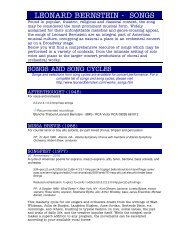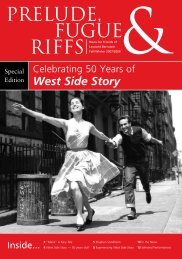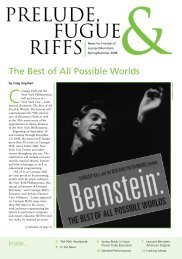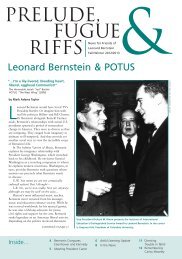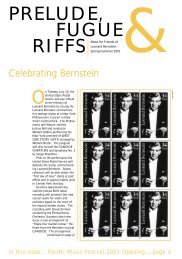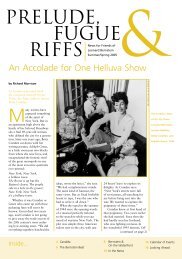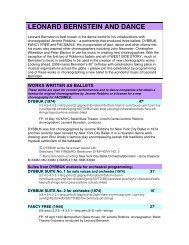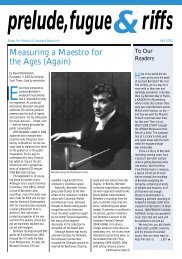The Bernstein Project - Leonard Bernstein
The Bernstein Project - Leonard Bernstein
The Bernstein Project - Leonard Bernstein
Create successful ePaper yourself
Turn your PDF publications into a flip-book with our unique Google optimized e-Paper software.
Discussing Mass<br />
Music critic Edward Seckerson<br />
and conductor Marin Alsop<br />
discuss Mass. This discussion<br />
is from a larger article about<br />
Marin Alsop that appeared in<br />
Gramophone Magazine.<br />
© WALTER SCOTT<br />
Does Marin Alsop think it’s<br />
a masterpiece? E.S.<br />
“Yes, because for <strong>Bernstein</strong><br />
nothing was ever perfect. For<br />
him there was no such thing. He<br />
rejoiced in the rough edges of<br />
spontaneity in everything he did.<br />
Mass is a piece that can and does<br />
weather human frailty.” M.A.<br />
Just as well. It is extraordinarily<br />
challenging to perform<br />
and in her new Naxos recording<br />
(the work’s fourth), Alsop went<br />
to exceptional lengths to achieve<br />
an authentic mix of performers<br />
with a keen understanding of the<br />
style. With a little help from Leslie<br />
Stifelman a friend at the sharp<br />
end of musical theatre — that is<br />
the Music Director on Kander<br />
and Ebb’s “Chicago” in New<br />
York — some 300 young hopefuls<br />
auditioned for the all-important<br />
“street singers” at the heart of<br />
Mass. <strong>The</strong>y have to be the real<br />
thing; the range of what is required<br />
of them is wild. <strong>The</strong>se aren’t pop<br />
songs, these are far-out-there art<br />
songs. Challenging sentiments,<br />
still more challenging vocals. E.S.<br />
“Mass is a microcosm<br />
of <strong>Bernstein</strong>’s<br />
personality. If you<br />
doubt its sincerity,<br />
if you deny its<br />
integrity, then you<br />
deny everything<br />
<strong>Bernstein</strong> was.”<br />
<strong>Leonard</strong> <strong>Bernstein</strong> and Marin Alsop<br />
Mass polarizes opinions, Mass<br />
divides as surely as it unites. But<br />
Alsop thinks, as do I, that the<br />
open hostility that comes at it from<br />
some quarters stems from a refusal<br />
to accept the validity of different<br />
musics and cultures co-existing.<br />
Which, in short, says more about<br />
the naysayers than it does about<br />
the piece. E.S.<br />
“You know, what’s interesting<br />
about Mass is just how<br />
prophetic it’s turned out to be.<br />
All those boundaries between<br />
genres, between different styles<br />
of music — they’re gone — and<br />
it may have been less threatening<br />
to some had they remained<br />
in place, but they didn’t. Besides,<br />
the level of sophistication is dazzling<br />
throughout. Tell me that<br />
the 11-tone second Meditation,<br />
impregnated as it is with allusions<br />
to Beethoven’s Ode to Joy, is not a<br />
touch of genius.” M.A.<br />
“A cornucopia of genius poured<br />
out with no restraint” was how<br />
<strong>The</strong> New York Times summed-up<br />
the musical values of Mass. Alsop<br />
goes further: “Mass is a microcosm<br />
of <strong>Bernstein</strong>’s personality. If you<br />
doubt its sincerity, if you deny<br />
its integrity, then you deny everything<br />
<strong>Bernstein</strong> was.” E.S.<br />
So, was <strong>Bernstein</strong> the<br />
eternal optimist or the ever<br />
hopeful pessimist? E.S.<br />
“I don’t know. It tended to be<br />
one or the other. But I think what<br />
makes Mass so very special is that<br />
it accepts our limitations as human<br />
beings and somehow transcends<br />
them. <strong>The</strong> ultimate message falls<br />
into ‘the eternal optimist’ camp,<br />
in that it says — you know, we are<br />
going to be ok...” M.A.<br />
<strong>Bernstein</strong>’s own doubts ran<br />
deep. In that last interview he<br />
gave me he expressed regret that<br />
so many of his peers had never<br />
embraced his music. Did Alsop, I<br />
wonder, agree that those musical<br />
excursions into thorny overgrown<br />
paths (his dabblings with atonality<br />
in pieces like Jubilee Games) were,<br />
to some extent, an attempt to gain<br />
him entrance into a club to which<br />
he didn’t quite belong? E.S.<br />
(continued on page 5)<br />
Prelude, Fugue & Riffs Fall/Winter 2009<br />
3



